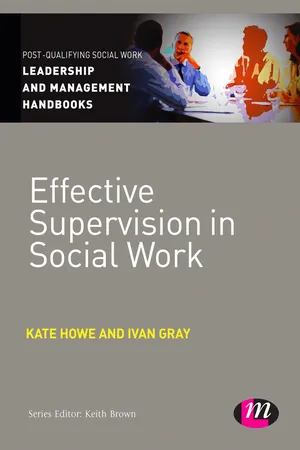
- 176 pages
- English
- ePUB (mobile friendly)
- Available on iOS & Android
eBook - ePub
Effective Supervision in Social Work
About this book
It is vital that social work managers and leaders are able to deliver and manage effective supervision to their teams. Recent social work reports such as the Munro Review into Child Protection (2011) identified poor supervision as a barrier to good and effective social work practice and highlighted the need for quality supervision to become embedded within departments. This book demonstrates how both managers and their staff can engage with supervision with a view to successful outcomes. There are detailed sections on audit tasks and reflection questions to enable readers to increase awareness of their role as well as develop action plans for improvement in their practice.
Tools to learn more effectively

Saving Books

Keyword Search

Annotating Text

Listen to it instead
Information
Appendix 1
Personal reflection on a supervision session: some key questions
The full Effective Supervision Unit provides the basis for reflection on supervision practice. However, some useful quick questions to consider after a session are:
Reflecting on the management of the task
- Did you get the information you needed to prepare?
- Had your staff member prepared?
- Did you check progress on actions from the previous session?
- Did you agree an agenda and cover it?
- Did each case/item get the time it needed according to its priority?
- Did you achieve good depth of discussion in exploring each case?
- Are you both clear on actions i.e. who, what and when?
- Are there any other issues that the session didn’t cover or information that you need? What will you do about this?
- Are all cases getting the attention they need?
- Did you make opportunity to reflect on and discuss learning and personal development?
- Did you give feedback on good practice and identify any practice that needed improving?
- Were key issues and decisions and actions recorded?
- Did you plan together for your next supervision session?
Reflecting on the relationship
(based on the National Occupational Standards for Counselling CLG2.1, ENTO, 2007)
- Were there any areas of conflict? Have they been resolved? How were they resolved?
- Did you leave sufficient space for your staff member’s agenda and allow your staff member to contribute?
- What feelings did you experience during the sessions and what generated them?
- How do you feel at the end of the session? What might be generating those feelings?
- Are you in any ways stuck or struggling to work with this staff member? What might be causing this? What can you do?
- Did your staff member show any signs of discomfort during the session? What might have caused this?
- When did they seem engaged and positive? What might have caused this?
- What do you think your staff member might be feeling at the end of the session? What might have caused this?
- Are you developing and improving your practice as a supervisor?
- Thinking back over sessions, are there any common themes emerging that may be significant in case management, the supervisees’ reactions and practices or in our relationship?
ENTO, 2007. National Occupational Standards for Counselling CLG2.1. Leicester: ENTO
Appendix 2
SCIE learning organisation audit: auditing organisational development
Please rate the following with regard to the information systems used within your organisation:
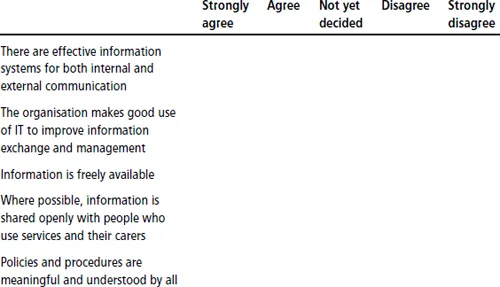
Please rate the following statements in terms of how they apply to the structure of your organisation:
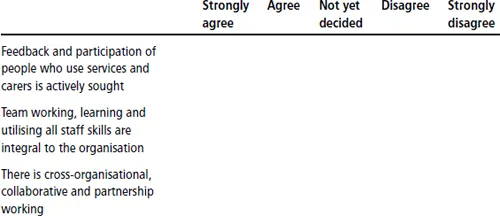
Please rate the following statements in terms of how far they apply to the culture of your organisation:
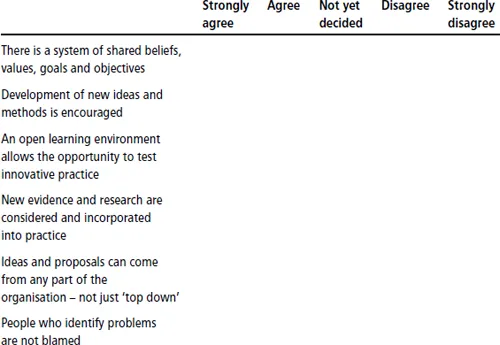
Are the following examples of human resource practice present in your workplace?
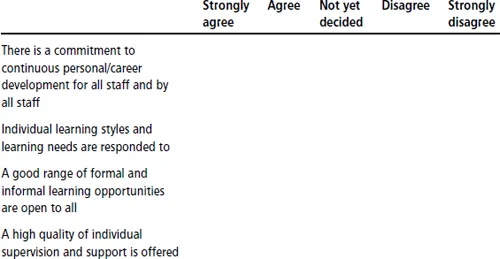
Are the following leadership strengths established in the organisation you work for?
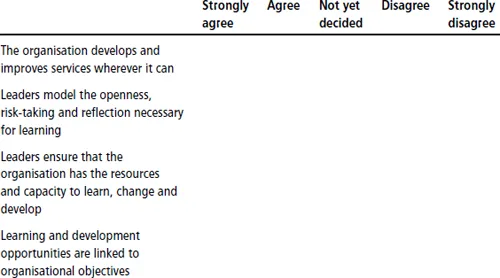
These questions have been adapted from the SCIE website (see: www.scie.org.uk/publications/learningorgs/files/key_characteristics_2.pdf).
Appendix 3
Effective Supervision Unit audit tool
In the following table we have added a commentary to the Effective Supervision Unit audit tool which is based on the supervisee’s perspective.
How could you use the audit tool to improve the quality of your practice as a supervisor?
How could you use it to improve the quality of the supervision that you receive?

1.1 Implement supervision systems and processes
| Performance criteria | Commentary |
| a. Implement supervision in the context of organisational policies, performance management and workforce development. 1 2 3 4 5 | You need to locate and familiarise yourself with your organisation’s supervision, appraisal, probationary and personal development policies and procedures. |
| b. Develop, implement and review written agreements for supervision. 1 2 3 4 5 | It is usual to have a supervision contract that summarises arrangements and responsibilities. They can be rudimentary, simply stating frequency, length and who has responsibility for setting them up. More complex contracts cover cancellation procedures, preparation and so on. Others may set ground rules for the relationship and identify such things as areas of interest or for personal development. |
| c. Ensure supervision records and agreed decisions are accurate and completed promptly. 1 2 3 4 5 | You need to keep a record, at the very least, of decisions made in supervision and whoever has responsibility for recording them will need them to be agreed and signed off. Usually it is the supervisor’s responsibility, but you should have a signed copy for your records or at least access to them. |
| d. Enable workers to reflect on supervision issues and act on outcomes. 1 2 3 4 5 | Your supervisor/s should encourage and give you space to reflect on your practice and identify your strengths, weaknesses and development needs and review your actions and care plans. |
| e. Monitor and review own supervision practice and learning, reflecting on the processes and implement improvements to supervision. 1 2 3 4 5 | There should be opportunity for you to comment on the quality of the supervision you have received. |
| f. Identify wider issues and raise them appropriately in the organisation and with other stakeholders. 1 2 3 4 5 | Your manager or supervisor should act as a broker identifying with you practice issues that need to be picked up on in the organisation more widely, so that the quality of services can be improved. |
| g. Enable access to specialist supervision, support, advice or consultation as required. Specialist supervision can include peer, therapeutic or clinical supervision. 1 2 3 4 5 | Specialist supervision can be an excellent way to develop your practice and can also be essential in some roles and situations which demand more support that your manager or usual supervisor/s can provide. |
1.2 Develop, maintain and review effective supervision relationships
| Performance criteria | Commentary |
| a. Create a positive environment for workers to develop and review their practice. 1 2 3 4 5 | Supervision should challenge your practice but it should be a positive encounter which you value and where challenge is matched with encouragement and support. You should be encouraged to take responsibility and take control in reviewing and evaluating your practice. |
| b. Clarify boundaries and expectations of supervision, including confidentiality. 1 2 3 4 5 | It pays to review your previous experiences of supervision and what works or doesn’t work for you. Good supervision contracts will cover these broader issues as well as clarifying confidentiality and what are (or not) suitable matters for supervision. |
| c. Ensure relationships are conducted in an open and accountable way. 1 2 3 4 5 | Both you and your supervisor/s are accountable for your practice so the relationship must be strong enough for you to share the details of your practice, including problems you are experiencing. Hidden practice can be dangerous practice. |
| d. Help workers to identify and overcome blocks to performance, such as work conflicts and other pressures. 1 2 3 4 5 | Effective practice is not just down to you. Others can influence your effectiveness in a positive fashion, as well as negatively. Your supervisor/s should also be able to help with these broader issues. |
| e. Assist workers to understand the emotional impact of their work and seek appropriate specialist support if needed. 1 2 3 4 5 | It is a tough job – one that can affect us all deeply. The emotion of your work needs to be on the agenda for the sake of your own health, but also because it can impact on your practi... |
Table of contents
- Cover Page
- Title
- Copyright
- Contents
- List of figures
- List of tables
- List of activities
- Foreword
- About the authors
- Introduction
- SECTION ONE: Fundamental concepts
- SECTION TWO: Relational aspects
- SECTION THREE: The organisational context
- Appendix 1: Personal reflection on a supervision session: some key questions
- Appendix 2: SCIE learning organisation audit: auditing organisational development
- Appendix 3: Effective Supervision Unit audit tool
- Appendix 4: Well-formed outcome template
- Bibliography
- Index
Frequently asked questions
Yes, you can cancel anytime from the Subscription tab in your account settings on the Perlego website. Your subscription will stay active until the end of your current billing period. Learn how to cancel your subscription
No, books cannot be downloaded as external files, such as PDFs, for use outside of Perlego. However, you can download books within the Perlego app for offline reading on mobile or tablet. Learn how to download books offline
Perlego offers two plans: Essential and Complete
- Essential is ideal for learners and professionals who enjoy exploring a wide range of subjects. Access the Essential Library with 800,000+ trusted titles and best-sellers across business, personal growth, and the humanities. Includes unlimited reading time and Standard Read Aloud voice.
- Complete: Perfect for advanced learners and researchers needing full, unrestricted access. Unlock 1.4M+ books across hundreds of subjects, including academic and specialized titles. The Complete Plan also includes advanced features like Premium Read Aloud and Research Assistant.
We are an online textbook subscription service, where you can get access to an entire online library for less than the price of a single book per month. With over 1 million books across 990+ topics, we’ve got you covered! Learn about our mission
Look out for the read-aloud symbol on your next book to see if you can listen to it. The read-aloud tool reads text aloud for you, highlighting the text as it is being read. You can pause it, speed it up and slow it down. Learn more about Read Aloud
Yes! You can use the Perlego app on both iOS and Android devices to read anytime, anywhere — even offline. Perfect for commutes or when you’re on the go.
Please note we cannot support devices running on iOS 13 and Android 7 or earlier. Learn more about using the app
Please note we cannot support devices running on iOS 13 and Android 7 or earlier. Learn more about using the app
Yes, you can access Effective Supervision in Social Work by Kate Howe,Ivan Gray,SAGE Publications Ltd in PDF and/or ePUB format, as well as other popular books in Social Sciences & Social Work. We have over one million books available in our catalogue for you to explore.